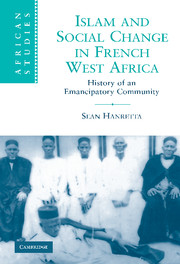Book contents
- Frontmatter
- Contents
- List of maps and figures
- Acknowledgments
- Note on orthographic conventions
- Abbreviations used in references
- Introduction
- Part One “The Suffering of Our Father”: Story and Context
- Part Two “I Will Prove to You That What I Say Is True”: Knowledge and Colonial Rule
- 4 Ghosts and the Grain of the Archives
- 5 History in the Zâwiya: Redemptive Traditions
- Part Three “What Did He Give You?”: Interpretation
- Conclusions
- Glossary
- Note on References
- Index
- Books in This Series
4 - Ghosts and the Grain of the Archives
Published online by Cambridge University Press: 15 December 2009
- Frontmatter
- Contents
- List of maps and figures
- Acknowledgments
- Note on orthographic conventions
- Abbreviations used in references
- Introduction
- Part One “The Suffering of Our Father”: Story and Context
- Part Two “I Will Prove to You That What I Say Is True”: Knowledge and Colonial Rule
- 4 Ghosts and the Grain of the Archives
- 5 History in the Zâwiya: Redemptive Traditions
- Part Three “What Did He Give You?”: Interpretation
- Conclusions
- Glossary
- Note on References
- Index
- Books in This Series
Summary
most of the documentary evidence on the history of Yacouba Sylla and his followers comes from surveillance files, intelligence reports, and captured correspondence that were assembled and preserved by the French colonial administration. These reports and dossiers on which we rely were not, of course, maintained to facilitate objective historical analysis, but rather as the working memory of a process of domination. Much recent theorizing by historians and others has sought to address the paradox that sources that are indispensable for the study of domination and exploitation are themselves marked by the often unconscious strategies that justified and legitimated such actions. Virtually all state archives are, in this sense, “technologies of rule” as well as monuments to those technologies. The archives on the Yacoubists are no different; they owe their general form to the broad strategies of French rule in Africa and to their relations with other instruments of governance, such as the colonial police force and administrative patronage networks.
There are many ways to respond to this problem. Systematic exploration of the rules that governed the production of colonial archives can tell us much about the rules of governing empires and help us identify more readily the gaps and silences within the knowledges of those who governed. To take one striking example, much of what is known about the Yacoubist community during the 1940s comes from the report compiled in 1943 by Commissaire Rortais in response to accusations that Yacouba Sylla was trading in slaves.
- Type
- Chapter
- Information
- Islam and Social Change in French West AfricaHistory of an Emancipatory Community, pp. 121 - 158Publisher: Cambridge University PressPrint publication year: 2009

